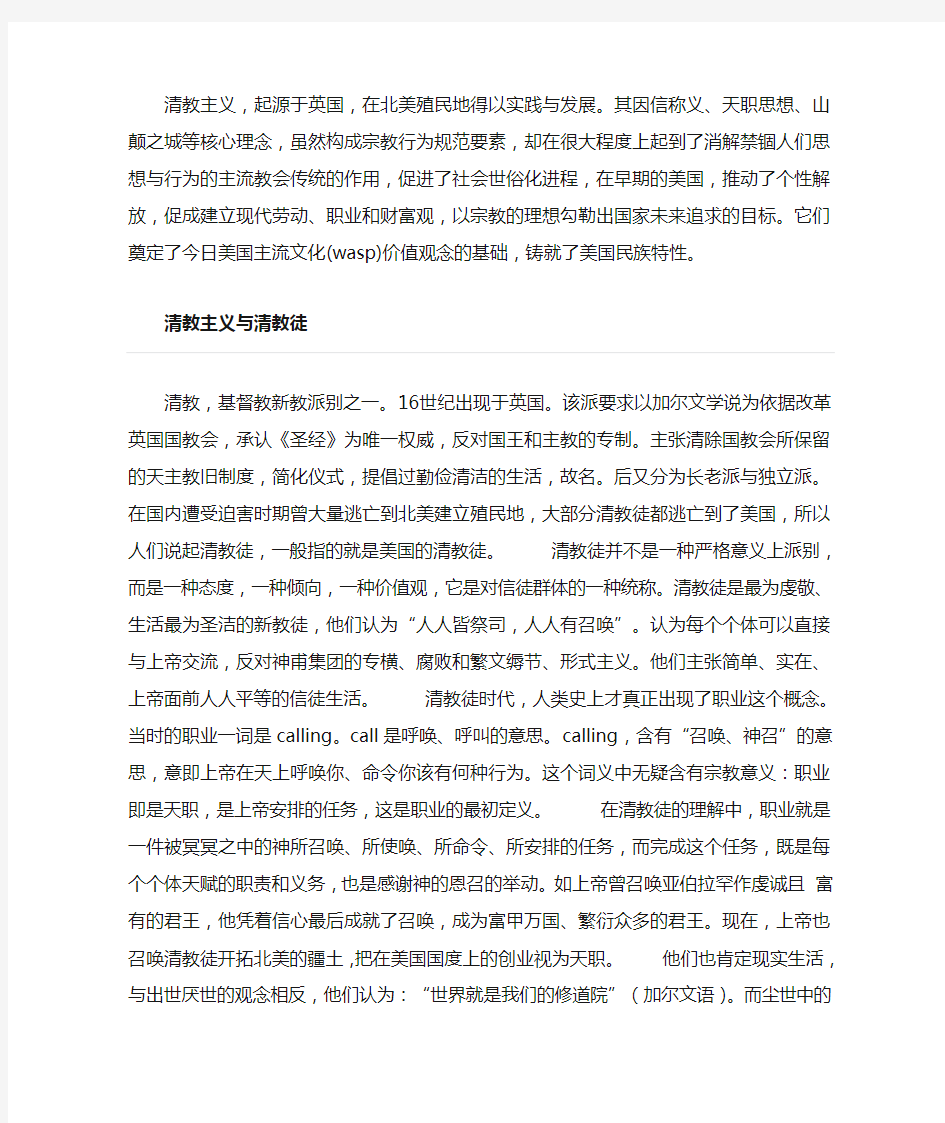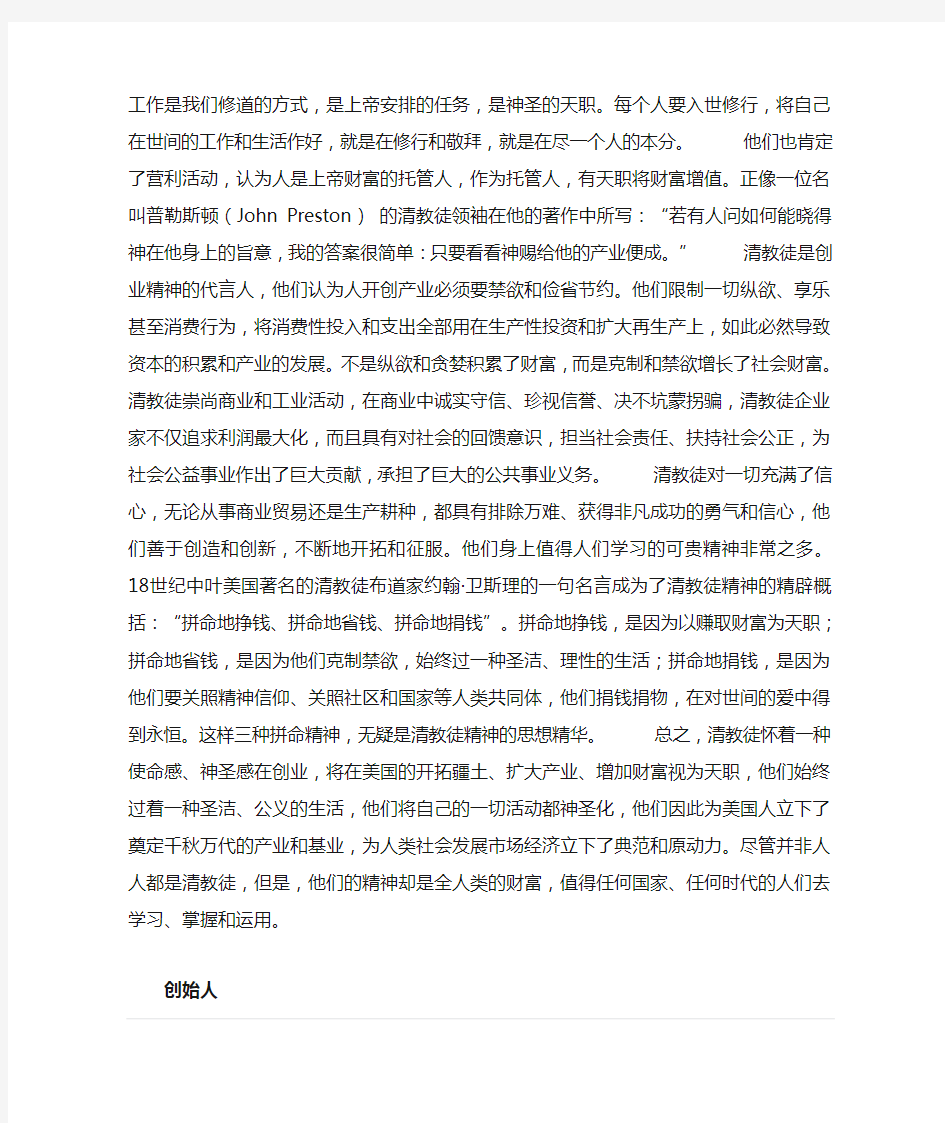清教主义


清教主义,起源于英国,在北美殖民地得以实践与发展。其因信称义、天职思想、山颠之城等核心理念,虽然构成宗教行为规范要素,却在很大程度上起到了消解禁锢人们思想与行为的主流教会传统的作用,促进了社会世俗化进程,在早期的美国,推动了个性解放,促成建立现代劳动、职业和财富观,以宗教的理想勾勒出国家未来追求的目标。它们奠定了今日美国主流文化(wasp)价值观念的基础,铸就了美国民族特性。
清教主义与清教徒
清教,基督教新教派别之一。16世纪出现于英国。该派要求以加尔文学说为依据改革英国国教会,承认《圣经》为唯一权威,反对国王和主教的专制。主张清除国教会所保留的天主教旧制度,简化仪式,提倡过勤俭清洁的生活,故名。后又分为长老派与独立派。在国内遭受迫害时期曾大量逃亡到北美建立殖民地,大部分清教徒都逃亡到了美国,所以人们说起清教徒,一般指的就是美国的清教徒。清教徒并不是一种严格意义上派别,而是一种态度,一种倾向,一种价值观,它是对信徒群体的一种统称。清教徒是最为虔敬、生活最为圣洁的新教徒,他们认为―人人皆祭司,人人有召唤‖。认为每个个体可以直接与上帝交流,反对神甫集团的专横、腐败和繁文缛节、形式主义。他们主张简单、实在、上帝面前人人平等的信徒生活。清教徒时代,人类史上才真正出现了职业这个概念。当时的职业一词是calling。call是呼唤、呼叫的意思。calling,含有―召唤、神召‖的意思,意即上帝在天上呼唤你、命令你该有何种行为。这个词义中无疑含有宗教意义:职业即是天职,是上帝安排的任务,这是职业的最初定义。在清教徒的理解中,职业就是一件被冥冥之中的神所召唤、所使唤、所命令、所安排的任务,而完成这个任务,既是每个个体天赋的职责和义务,也是感谢神的恩召的举动。如上帝曾召唤亚伯拉罕作虔诚且富有的君王,他凭着信心最后成就了召唤,成为富甲万国、繁衍众多的君王。现在,上帝也召唤清教徒开拓北美的疆土,把在美国国度上的创业视为天职。他们也肯定现实生活,与出世厌世的观念相反,他们认为:―世界就是我们的修道院‖(加尔文语)。而尘世中的工作是我们修道的方式,是上帝安排的任务,是神圣的天职。每个人要入世修行,将自己在世间的工作和生活作好,就是在修行和敬拜,就是在尽一个人的本分。他们也肯定了营利活动,认为人是上帝财富的托管人,作为托管人,有天职将财富增值。正像一位名叫普勒斯顿(John Preston)的清教徒领袖在他的著作中所写:―若有人问如何能晓得神在他身上的旨意,我的答案很简单:只要看看神赐给他的产业便成。‖清教徒是创业精神的代言人,他们认为人开创产业必须要禁欲和俭省节约。他们限制一切纵欲、享乐甚至消费行为,将消费性投入和支出全部用在生产性投资和扩大再生产上,如此必然导致资本的积累和产业的发展。不是纵欲和贪婪积累了财富,而是克制和禁欲增长了社会财富。清教徒崇尚商业和工业活动,在商业中诚实守信、珍视信誉、决不坑蒙拐骗,清教徒企业家不仅追求利润最大化,而且具有对社会的回馈意识,担当社会责任、扶持社会公正,为社会公益事业作出了巨大贡献,承担了巨大的公共事业义务。清教徒对一切充满了信心,无论从事商业贸易还是
生产耕种,都具有排除万难、获得非凡成功的勇气和信心,他们善于创造和创新,不断地开拓和征服。他们身上值得人们学习的可贵精神非常之多。18世纪中叶美国著名的清教徒布道家约翰·卫斯理的一句名言成为了清教徒精神的精辟概括:―拼命地挣钱、拼命地省钱、拼命地捐钱‖。拼命地挣钱,是因为以赚取财富为天职;拼命地省钱,是因为他们克制禁欲,始终过一种圣洁、理性的生活;拼命地捐钱,是因为他们要关照精神信仰、关照社区和国家等人类共同体,他们捐钱捐物,在对世间的爱中得到永恒。这样三种拼命精神,无疑是清教徒精神的思想精华。总之,清教徒怀着一种使命感、神圣感在创业,将在美国的开拓疆土、扩大产业、增加财富视为天职,他们始终过着一种圣洁、公义的生活,他们将自己的一切活动都神圣化,他们因此为美国人立下了奠定千秋万代的产业和基业,为人类社会发展市场经济立下了典范和原动力。尽管并非人人都是清教徒,但是,他们的精神却是全人类的财富,值得任何国家、任何时代的人们去学习、掌握和运用。
创始人
——约翰·诺克斯我们根据哪些方面才能说约翰"诺克斯是―清教主义的创始人‖呢?第一点,是根据他的独立创新的思想顾名思义,清教徒都是有独立思想的,他永远不会是个―代表既成体制的人‖;他不光是在宗教信仰方面不是属于―国立教会‖的,就是在其他方面也是一样。这一点非常重要。有人生下来就是―代表既成体制的人‖,不管在哪一方面,他们永远站在当权者那一边,永远属于一些固定了的团体。他们只致力于保存旧有的秩序。但清教徒基于他的本性与精神,永远不会是那个―代表既成体制的人‖,这是由于他的独立性与创新精神,也因为他自己研读圣经,渴慕认识真理,就不管别人怎样说。第二点,约翰·诺克斯有资格称为“清教主义的创始人”,是因为他能把清教主义信仰的导向原则明确地实行出来。这些原则,首要的是以圣经——神的话,为最高的权威。这是诺克斯坚守的原则,如果没有圣经的根据,他就绝对不去做,也不准许弟兄们去做。第二个原则,是主张教会―改革要延伸到根部与枝条‖,这话出自诺克斯之口。换句话说,清教徒并不以仅仅在教义上有改革而感到满足。(诺克斯和他其他清教徒们,与英国的其他带领的人意见相左,也是出于这原因。)很多人都主张改革教义,都是加尔文派的。但差别之处,在于清教徒对改革的彻底要求,不仅要求改革教义,也要把改革贯彻到实践方面,包括对教会本质的整个看法。对清教徒来说,改革不仅是修改,或一点改善,改革是教会的―全新的建造‖——不仅是将已存在的修改一下,这个建造是根据新约的教导。他要把教会恢复到新约圣经里的模式。基于此,他认为必须改革教会的仪式,就是教会崇拜的处理和所有圣礼的施行。他这样说:―向神的敬拜,尤其是圣礼的施行,必须以圣经所指明的为准,不得添加,也不得减少。‖又说:―教会没有权柄,可以自行发明一些宗教仪式,再自行加上重要的意味。‖他因为说了这样的话而受到了指控。他分辩说:―人不可创立或发明一种讨神喜悦的宗教,他只能持守并遵行从神而来的信仰,不能加以删减或修改。‖他所高举的原则就是这样。但更重要的是,他把原则应用出来。没有所谓理论上或学术性的清教徒。不错,有人对清教派思想感兴趣,
但是,除非他们能实行这些思想,否则就是清教主义的叛徒,因为真正清教徒的特色,就是实行。还有一件事很重要。当时的习惯是在领受圣餐时下跪,这是安立甘派的做法。约翰"诺克斯是第一个教导信徒坐下来领受的。他不但这样教导,他自己也先实行出来;这是把清教主义精神应用出来的表现。至于洗礼方面,他拒绝为已被逐出教会的人的儿童施洗,也反对平信徒可以私下给人施洗的传统,也拒绝在施洗时手划十架的表号。有件事很值得留意。诺克斯曾被邀请前往法兰克福,担任在那里逃亡的英国信徒的教会的牧师。在那里,他和惠廷厄姆(William Whittingham),就是那部著名的日内瓦圣经的主要翻译者,一起草拟了一份教会崇拜的仪文,以代替他们所摒弃的公祷书,并公开说出他对公祷书的意见,结果被逐出。之后他前往日内瓦,该仪文成了日内瓦的教会所采用的教制,人称它为―日内瓦典籍‖(Geneva Book),直到如今,苏格兰教会正式采用的,就是这本教会仪文的典籍。因此,在日内瓦的英国信徒的教会,可算是第一个真正清教徒信仰的教会。这一个事实,可以作为约翰"诺克斯是英国清教主义的创始人的最有力证据。他对英格兰的清教徒的影响,在他死后一直持续下去。他在苏格兰所写的《教会改革的历史》(History of the Reformation),不在苏格兰印行,竟然在1578年由在英国的英格兰清教徒印行出版。不单如此,一位做带领的清教徒约翰"菲尔德(John Field),在印行约翰"诺克斯的一篇文章的时候,在序言中赞扬他是―神所用的尊贵可敬的器皿‖,而且介绍该篇文章―印证他敬虔忠心的劳苦,表明他勇往直前的无畏精神‖。在接下来的世纪中,约翰"诺克斯的影响仍处处可见。弥尔顿在他为处死查理一世辩护的文告中,就多次引用约翰"诺克斯的见解作支持。这就是为什么我一直强调,约翰"诺克斯有独特敏锐的眼光,对圣经也有独到的见解,这尤其表现在必要时与掌权者对抗,甚至要把他置于死地的见解上。弥尔顿能领会到这一点,可见约翰"诺克斯实在堪称为清教主义的创始者。1683年,查理二世开始公开承认他信奉罗马天主教,下令在牛津当众将约翰"诺克斯所出版的著作全部付之一炬,并禁令人民读他的作品。那时是1683年,而约翰"诺克斯早已在1572年去世。他的影响至深至大,可见他实在是英格兰,同时也是苏格兰的清教主义的创始人。移民美洲的早期清教徒对政府和掌权者的看法,和约翰"诺克斯所见的完全一致,正如卡莱尔(Thomas Carlyle)所说的,他也同样可算是美国清教主义的创始者。甚至可以认为,他的思想,可说是1776年成功的美国独立战争的原动力;他是这种争取独立精神的开路先锋。
Historically Puritanism began early (c.1560) in the reign of Queen Elizabeth I as a movement for religious reform. The early Puritans felt that the Elizabethan ecclesiastical establishment was too political, too compromising, and too Catholic in its liturgy, vestments, and episcopal hierarchy. Calvinist in theology, they stressed predestination and demanded scriptural warrant for all details of public worship. They believed that the Scriptures did not sanction the setting up of bishops and churches by the state. The aim of the early Puritans such as Thomas Cartwright was to purify the church (hence their name), not to separate from it. However, by 1567 a small group of lay rigorists was discovered meeting secretly in London to worship after the pattern of the service of the church in Geneva.
〖Branches〗
Although Puritans believed that if they searched the Scriptures long enough they would eventually agree, they early differed on the nature of the church polity advised in the Bible. The parish was the unit of the Puritan church; the parochial group of church members elected ministers. The main body of Puritans, the Presbyterians (see Presbyterianism), favored a central church government, whereas the separatists, Independents or Congregationalists (see Congregationalism), defined the church as any autonomous congregation of believers, emphasized the point that one could arrive at one's own conclusions in religion, and opposed a national, comprehensive church.
〖Persecution and Emigration〗
During the reign of James I, the Presbyterian majority unsuccessfully attempted to impose their ideas on the established English church at the Hampton Court Conference (1604). The result was mutual disaffection and a persecution of the Puritans, particularly by Archbishop William Laud, that brought about Puritan migration to Europe and America (see Mayflower). Those groups that remained in England grew as a political party and rose to their greatest power between 1640 and 1660 as a result of the English civil war; during that period the Independents gained dominance. The great Puritan apologist of this period was John Milton. During the Restoration the Puritans were oppressed under the Clarendon Code (1661–65), which secured the episcopal character of the Established Church and, in effect, cast the Puritans out of the Church of England. From this time they were known as nonconformists.
〖Influence on American Society〗
In New England, in the Puritan ―Holy Commonwealth,‖ some 35 churches had been formed by 1640. The Puritans in New England maintained the Calvinist distinction between the elect and the damned in their theory of the church, in which membership consisted only of the regenerate minority who publicly confessed their experience of conversion. Ministers had great political influence, and civil authorities exercised a large measure of control over church affairs. The Cambridge Platform (1648) expressed the Puritan position on matters of church government and discipline. T o the Puritans, a person by nature was wholly sinful and could achieve good only by severe and unremitting discipline. Hard work was considered a religious duty and emphasis was laid on constant self-examination and self-discipline. Although profanation of the Sabbath day, blasphemy, fornication, drunkenness, playing games of chance, and participation in theatrical performances were penal offenses, the severity of the code of behavior of the early Puritans is often exaggerated.
In 1662 it was made easier for the unregenerate majority to become church members in Massachusetts by the adoption of the Half-Way Covenant. Clerical power was lessened by the expansion of New England and the opening of frontier settlements filled with colonists who were resourceful, secular, and engaged in a struggle to adapt to a difficult environment. In 1692 in Massachusetts a new charter expressed the change from a theocratic to a political, secular state; suffrage was stripped of religious qualifications.
After the 17th cent. the Puritans as a political entity largely disappeared, but Puritan attitudes and ethics continued to exert an influence on American society. They made a virtue of qualities that made for economic success—self-reliance, frugality, industry, and energy—and through them influenced modern social and economic life. Their concern for education was important in the development of the United States, and the idea of congregational democratic church government was carried into the political life of the state as a source of modern democracy. Prominent figures in New England Puritanism include Thomas Hooker, John Cotton, Roger Williams, Increase Mather, and Cotton Mather.
〖Bibliography〗
See P. Miller, The New England Mind (2 vol., 1939–53); E. S. Morgan, Visible Saints (1965); J. E. C. Hill, Society and Puritanism in Pre-Revolutionary England (2d ed. 1967); H. C. Porter, Puritanism in Tudor England (1970); C. L. Cohen, God's Caress: The Psychology of Puritan Religious Experience (1986); C. E. Hambrick-Stowe, The Practice of Piety (1986); S. Foster, The Long Argument: English Puritanism and the Shaping of New England Culture, 1570–1700 (1991).
